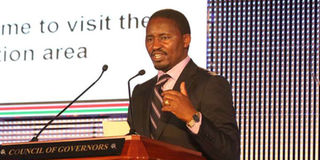Devolution can be greater than the sum of its parts

Mwangi Kiunjuri, the Cabinet Secretary for Devolution and Planning, at the third annual devolution conference in Meru on April 22, 2016. PHOTO | JOSEPH KANYI | NATION MEDIA GROUP
What you need to know:
Devolution is about local people because it aims to take decisions and services closer to the people affected by them. It seeks to include the people in identifying the services they need and expect, and in making decisions about those services.
Which is why counties should be exemplars of democracies in which local governments, assemblies, businesses, lobbies, civil society and residents work together to plan for and provide opportunities, services and growth.
On Monday, the Financial Times, that global comparator of business and economic journalism, helpfully reported that growing entrenchment of devolution in Kenya was helping defuse political tensions ahead of this year’s General Election.
The media house report prompted this take. You will certainly read, hear and see them presented variously by media as titanic tussles going to the wire; hotspots; and hotbeds of the 2017 General Election. I am talking about the upcoming gubernatorial races; such branding will deflect and distract attention and scrutiny from the essence of devolution and its current status.
Electoral contests in each of Kenya’s 47 counties must not be about personalities but about what people are saying about the state of devolution now and going into the future.
Devolution is succeeding or failing because of the people who manage it, led by governors and their cabinets, followed by county assemblies and the local people.
Local people? Yes, devolution is about local people because it aims to take decisions and services closer to the people affected by them. It seeks to include the people in identifying the services they need and expect, and in making decisions about those services.
Which is why counties should be exemplars of democracies in which local governments, assemblies, businesses, lobbies, civil society and residents work together to plan for and provide opportunities, services and growth.
IMPROVE LIFE
Therefore, four years on, local people should be able to point to something – a road, health centre or market – that is helping improve life, and be proud to have participated in its creation.
They should be able to boast that Members of County Assemblies, (MCAs), working with ward elders, women, youth and civil society, helped found promising cooperative-based businesses.
Put another way, devolution should be seen to have helped address and redress local economic challenges; put local political issues and their solutions on the front burner; identified and responded to people’s immediate and continuing development needs; and create wealth and jobs.
Therefore, governors and MCAs who seek to defend their seats must be judged, and forced to run, on their records, especially as regards empowerment of their constituents.
It is not enough for governors to argue that they have been starved of funds or that four years is not enough time to initiate and implement projects. Let them show what, in terms of development, they have done with the little money they were allocated over the past four years.
As for those who seek to unseat governors and MCAs, they must not only point out where and why the incumbents are failing, but also spell out their plans for ensuring the constituents will benefit from it.
IN OFFICE
What this means is that it is the people, the electorate, that must hold the feet of governors and MCAs to the fire when they are in office, seek to get in or to stay in. Electors must seek the best from MCAs, governors and their rivals because devolution was created to make their lives better; to redress the imbalances of skewed development by the centre; and, therefore, to develop Kenya from the bottom up.
Realising development from the bottom up means experiencing changes for the better from their household, ward, constituency and county economies. When this happens, as the FT reported, then the high premium that community thought leaders previously placed on the presidency and the massive stock they invested in presidential polls, will be greatly diminished.
It is significant that the FT report centred around the Kalenjin counties of Elgeyo Marakwet and Uasin Gishu and was anchored in the fetching pronouncements of local leadership.
It is uplifting that leaders in whose backyards the atrocities of the 2007 post poll violence occurred are vouching for devolution as defusing political tensions as Kenya gears up for another General Election.
But there is still work to be done. One, tribalism, nepotism and cronyism blight devolution. Two, it is abundantly clear that misuse, abuse and downright theft of public resources threatens devolution.
In both cases, the culprits are governors and county assemblies, which explains why the coming election must be a referendum on their performance.
Last, that tells political parties that they must not interfere in the nominations of candidates for county assemblies and governors. Put another way, the people of Kenya must own devolution from the bottom up in order to protect it and ensure its success.





